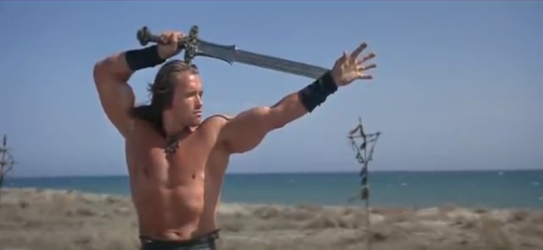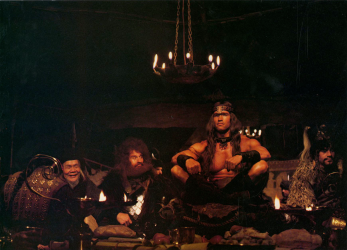Conan! What is best in life?
“To crush your enemies.
See them driven before you.
And to hear the lamentation of their women.”“Arnie! Arnie! ARNIE! Stop looking at the camera, Arnie! ARNIE!”
So goes the longest speech in Arnold Schwarzenegger’s film career to that point and, we must be honest, it taxes him greatly. The musclebound dude, who had to lose 30-40 pounds to play Conan the Barbarian (a fact that delights The Boy no end) has not the grace nor even the diction to play Robert Howard’s character, but we love him nonetheless. Indeed, nobody ever taught the man to open his throat, so even his cries of distress, when being attacked by a lascivious sorceress or giant snake, are comical.
Of all the revival films we’ve seen this year, this was the least attended. In fact, a showing of Batman: Mask of the Phantasm was completely sold out. Alas, only a dozen people showed up to John Milius’ 1982 salvaging of another questionable Dino De Laurentis project, which is a shame because there is much to admire in this film.
Like Arnold’s physique. It’s not bad. You may have heard about it. Schwarzenegger was pretty well known at the time, bodybuilding having crept into public awareness in the ’70s as well as concerns about steroids. (It was probably an episode of “Quincy”.) The strongman had made a few appearances in the past, of course. He played Hercules in Hercules Goes Bananas (aka Hercules In New York) but the film, as-released, had his voice dubbed over. (And the guy who did it—his voice is one of the most familiar sounds of my childhood but he’s given no credit.)

There’s virtually no chance that sword is sharp.
He would later stand around in some films until the largely forgotten 1979 Kirk Douglas/Ann-Margret homage to Road Runner cartoons, The Villain, where his countenance could be better described as clueless-but-benign. Not a lot of words for him in that, but if memory serves, Kirk Douglas is probably the only guy who can claim to have been in a movie with Schwarzenegger and stolen the girl from him. (Is it good? you wonder, perhaps. Well, let’s just say that IMDB puts it right in the center of director Hal Needham’s pack, with Cannonball Run near the top and Cannonball Run II near the bottom.)
And here he is front and center, though hardly loquacious but still pretty bogged down with a tongue that seems as clumsy as his body. The movie still moves well thanks to Mako’s narration—Milius wanted Arnold to be the narrator but the studio demurred; at this point we can cede the point to the studio—and his performance alongside a genuinely warm and fun Sandahl Bergman. Some clever editing makes their awkward love scene (a first for both of them) rather less so.

She usually looks more natural in the action scenes than he does.
Also carrying the film through its more-Kull-than-Conan-but-movie-audiences-aren’t-gonna-know-that opening and lengthy origin story is Basil Poledouris’ iconic score, used quite frequently since then to indicate battle and bloodlust. It’s almost inconceivable to think that Brad Fiedel didn’t have this squarely in mind when writing the theme to Terminator, but perhaps he was just cribbing from Holst, too.
James Earl Jones and Max von Sydow give assists, but the latter has a small part early on, and it’s possible that Jones’ physical presence is less imposing than his voice, or it may simply be that he seems to be remote from the proceedings in a way that makes them unconvincing (even if he can turn into a giant snake). The sets are nice, the costumes, too. The movie is at its best in the middle, when it’s more like a swashbuckling serial, and weaker at the ends when a tired-even-for-the-time tale of vengeance is shoehorned in. The effects hold up better than you’d think, for the most part.
Conan’s #1 fan, E. Gary Gygax gave a scathing review of this film when it came out, calling it “Conan Meets The Flower Children Set” and saying it’s passable for the effects but doesn’t capture the character of Conan at all. This is true, but neither has any film (ever, of the scores made) come close to capturing Tarzan—including the ones Edgar Rice Burroughs work on personally (and later mocked in his books, on the very sound basis that no mere actor could capture The Ape Man’s wildness).
The kids enjoyed it, probably more than I did, but the enjoyment to be had here is the kind that got Milius blacklisted: It’s a gung-ho embrace of macho, militaristic (at the time, “jingoistic”) ethos. (This and Red Dawn were enough to end his career.) It’s sincere, enthusiastic, and while not morally black-and-white, it certainly embraces the notion of good and evil as being things to strive toward and away from, respectively. Followed by an inferior sequel.

Conan’s parents were killed by Darth Vader with an assist from Spinal Tap.


One thought on “Conan The Barbarian (1982)”